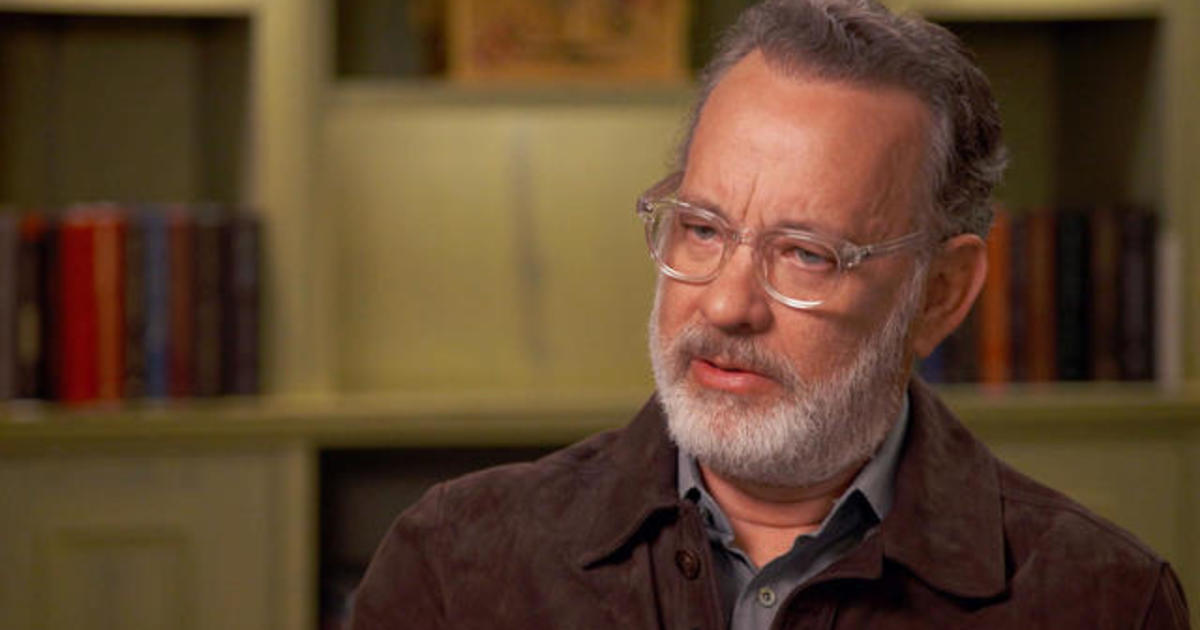
Taking on the role of Mister Rogers was “terrifying,” award-winning actor Tom Hanks said. In an interview with “CBS This Morning” co-host Gayle King, Hanks spoke about why it was important to be “authentic.”
“A Beautiful Day in the Neighborhood,” out Friday, is based on an “Esquire” article written by Tom Junod and the friendship that blossomed between the journalist and Fred Rogers. The hardest part about playing the beloved character was “slowing down,” Hanks said.
“Not interrupting people in the middle of them asking questions, not jumping to the conclusion that I know exactly what I’m going to say while you’re still trying to formulate a question,” he explained.
“Was it hard for you to do?” King asked.
“It was — it was terrifying,” Hanks said.
“You know what’s interesting to hear that it’s terrifying because people think that, of all the roles that you’ve done, this would be a lock for you to do, and certainly the easiest for you to do,” King said.
“There’s no such thing as an easy role to do,” Hanks said. “Because the moment I said yes … I began to have the night sweats that go along with trying to play.”
Hanks said he has played several real people, but it was challenging to play Fred Rogers because he “was a very, very public persona. And everybody has an idea of what Fred is, what Fred was like, the mysteries behind Fred.”
“The terror that goes along with it is that … you want to land in a place that people recognize as true human behavior, whether you’re playing somebody who’s real or somebody who’s not,” he said. “And if it’s not authentic, … you’re actively lying in an art form that is supposed to be holding the mirror up to nature.”
When Hanks was young, he said, he “didn’t pay any attention” to “Mister Rogers’ Neighborhood.”
“It was this odd show that looked very cheesy,” he said. “The puppets, their mouths didn’t move. And it was so obvious that he was doing all the different kinds of voices. And so I remember seeing it, you know, when you’re 13, 14 years old, and I was already saying, ‘Come on, cut. Move to something else. Make it a little snappier.’ … It’s not for 9-year-olds. … It’s for an impressionable mind that does not know how the world works at all.”
Rogers had the ability to make people feel “valuable,” Hanks said. “Doesn’t matter who you are. That’s what I think Fred was able to make people feel — not necessarily better, not necessarily stronger, but Fred made people feel worthwhile.”
“Every person I talk to who said, ‘Oh, when you spoke to Fred, you felt like you were the only person in the world that mattered to him,'” Hanks said.
“That’s a gift, Tom,” King said.
“It’s a gift, but it’s also a practice,” Hanks said.
Hanks brought Rogers to life with a little help from the woman who knew him best, Joanne Rogers, his wife of 50 years. She even lent Hanks some of Fred Rogers’ ties.
“Anytime you could have some sort of, like, kind of, like, little talisman like that in there, it ends up being special,” Hanks said. “That’s a big deal.”
The attention to authenticity is at the core of every Hanks role. The Academy Award winner has played a range of characters with his everyman charm, but there are some roles he said he won’t play.
“You don’t seem to gravitate toward bad guy roles. Is that deliberate on your part?” King asked.
“I’ve played guys that did bad things. But it’s the motivationalist bad guy role that I don’t buy. Even when I was young, I did not like movies that were just the standard antagonist, protagonist bend. James Bond movies are really cool and I absolutely love them, but how of — I don’t understand a guy who just says, ‘Before I kill you, Mr. Bond, perhaps you’d like a tour of our installation.’ I don’t get it,” Hanks said.
The actor said he would love to play some bad guys, like Shakespeare’s Iago in “Othello” or Richard III.
“There’s all sorts of really bad people out there, but I understand what their motivations are,” Hanks said. “The person who is just bad, be it Skeletor … or Darth Vader or something like that, at the end of the day, I say, ‘But why? What turned there?'”
Asked if the Mister Rogers role changed him, Hanks said all his roles do “one way or another.” “Fred Rogers … every day on the call sheet, there was an attached quote of Fred’s, and sometimes they were long and sometimes they were very, very simple.”
One of the quotes, he said, was “The three secrets of happiness are be kind, be kind and be kind.”
“And you think, ‘Well, that’s namby-pamby, that’s goody two shoes,'” Hanks said. “No matter what your bent is, being kind means you give everybody a fair shake. … Being kind is just being open to a possibility of making a simple choice that makes a day a little bit better.”

